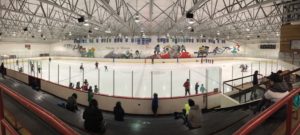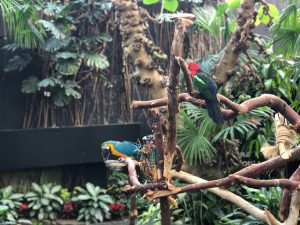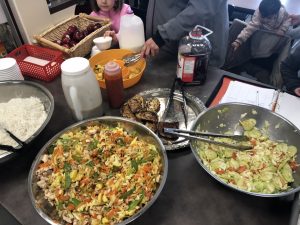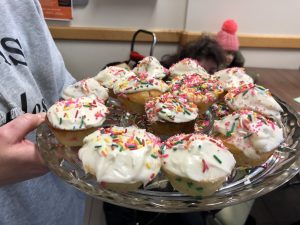Hi! My name is Azumi and I am in my first year in the Faculty of Arts in UBC. Since I have been taking the Introduction to Sociology course in the Global Citizen stream of CAP, I have been able to get involved in the Trek Program this year. Instead of attending regular discussion sessions, Trek students get involved in community engage programs and volunteer in their respective placements throughout the year. My placement was at YWCA Crabtree Corner in Vancouver Downtown Eastside, and I participated in the Saturday Family Activity Program there.
YWCA Crabtree Corner is an organization which aims to support marginalized women and their families in Downtown Eastside. In the Saturday Family Activity Program, families can get hot meals, donated items, and can attend afternoon activities such as swimming, skating, visiting the Christmas market, or so on. As a volunteer, I helped making the hot meals, enjoyed arts and crafts with children, and supported the families in the afternoon activities.

Ice-Skating-day

Visiting-the-Conservatory-day


Hot Meals: from Chinese New Years and from Birthday Celebrations
Since I had lived in Japan for 19 years before I came to Canada, interacting with the local community definitely had a positive influence on my sense of belonging. Basically, we get to know the people, the area, Vancouver, (and how to cook) by helping the kitchen, eating good food, going out, and playing around with children. However, more than that, this experience made me think a lot about communities in marginalized society both in Japan and Canada, since I have volunteered a little in a Japanese food bank as well. Generally speaking, the culture of volunteering and acceptance towards NGOs are much more developed in Canada compared to in Japan. Personally, I feel Japan is super humble and attentive, which is indeed an important thing especially when working with vulnerable people, while it can create an uncomfortable community which prevents people to participate in it. Whereas, the community I experienced in YWCA Crabtree Corner was much more dense, relying on each other, and people were sharing their personal issues much more than I expected.
On the other hand, the reality and people’s perception towards drug use and addiction was one of the tough things to accept for me in terms of cultural difference. In Japan, stigma around drugs and the restriction towards drug use seems to be stronger than in Canada. Thus, seeing people’s lifestyles in Downtown Eastside and hearing people talking about drugs as a normal thing there was shocking for me, and it took quite a bit of time to deconstruct my narrow-minded idea of intolerance towards drug use. Whereas, it made me confused when I noticed that the prevalence of drugs and addiction in the area was allowing people to accept them and help each other, instead of stigmatizing it and imposing the responsibility to individuals. If people are warmer when issues are prevalent, what is a correct society?
From my experience in Trek, I began to think community construction by the organization is playing a biggest role in the society, while the organization also provides physical aids such as foods or utilities. Even if we had the same money and time, conducting a family activity program instead of merely giving away food and money has been contributing to people’s mental wellbeing and children’s healthy development. Even though us volunteers don’t have special skills to help people to get out from their situation, we could support them by making the community a better place, and we will benefit from the community as well.
While the community is so dense, heartful, and willing to live with hope and kindness, I got surprised how the whole area of Downtown Eastside is hidden, and is easily ignored by the rest of the society. When my friend and I get on the 14 bus to commute to YWCA Crabtree Corner, it is pretty clear that the passengers on the bus changes completely before and after we arrive at East Heisting. I also heard many stories of misses and losses in the area, which never gets covered in news. I get so scared imagining that if I hadn’t attended this program, I could have become one of them who ignores people who live there while knowing their existence.
This involvement to my placement made me think a lot, including what we learn in sociology classes. Indeed, learning in practice is helping my learnings for sure. But more than that, I feel it is suggesting the way how we can learn to contribute to change the society. Merely learning sometimes becomes so depressing for me because I don’t know what I can do to fix the messy world. Of course, attending to volunteers can’t fix the root causes of what people are suffering for, but learning the fact as a firsthand experience has allowed me to contemplate these issues in UBC as well.
While I am going back to Japan for two months for vacation and my Trek program has officially finished, I am planning to come back for my placement personally to continue my volunteer work from June. I am hoping to gain more from my experience and get involved to the community. I really recommend future students to choose to do Trek!!
*All the photos are taken by Suvi Hoo